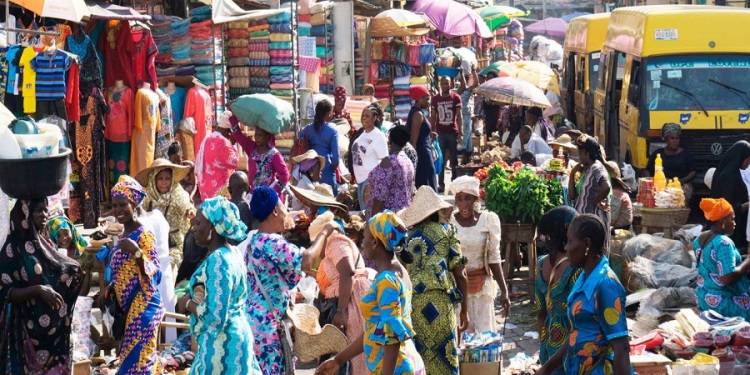Headlines
Inflation Surge: Nigerians Expected to Allocate 54.9% of Income on Food in Coming Six Months, Reports CBN

According to the Central Bank of Nigeria, Nigerians will spend 54.9% of their income on food due to soaring inflation rates over the next six months. Find out what this means for households and the economy.
According to a recent survey conducted by the Central Bank of Nigeria (CBN), Nigerian households will be compelled to allocate a major part of their income towards food during the upcoming six months due to an increase in inflation rate.
According to the latest report released by the National Bureau of Statistics (NBS), inflation has reached a staggering rate of 33.40%, with food prices experiencing an increase in inflation exceeding 40%.
The poll, as reported by the CBN, was carried out between July 22 to 26 in 2024. The response rate recorded was a high of about 99.7 per cent with a sample size drawn from NBS master list consisting of around1,665 households within all states including Federal Capital Territory in Nigeria.
The CBN, in its publication of the Household Expectation Survey on their website, reveals that numerous Nigerians plan to reduce purchases of non-essential items within the upcoming three to six months.
In the next six months, their plan is to allocate 54.9 percent of their income towards food items nonetheless.
According to the poll, consumers intend to allocate a significant portion of their income over the next half-year towards various expenses. The breakdown includes food and household items (54.9 points), education (35.4 points), transportation (30.2 points), electricity costs (20.0 points) as well as medical bills 12. points).
Conversely, the participants have no intention of allocating a significant portion of their earnings towards high-cost purchases like acquiring real estate, automobiles or household gadgets.
Furthermore, Nigerians have no desire to allocate funds towards investments such as the acquisition of real estate or other forms of investment. Additionally, they lack any intention to save their earnings.
According to the survey conducted by the central bank, it is evident that their current family financial situation indicates they will resort to tapping into their savings or incurring debt.
Perception and Outlook of Inflation
A total of 83.7% of the survey participants held a prevailing view towards inflation in July 2024.
The prevailing opinion was that the present inflation rate stood at a significant level, registering an index of -61.1 percent.
Upon analyzing the responses, it was discovered that households have a slightly higher index (-63.3%) in comparison to businesses which ranked at -58.7 points.
READ ALSO: CPPE Warns FCCPC Against Intimidating Traders During Commodity Inflation
The data suggests that businesses have a more positive outlook compared to households, as their perception of the current inflation rate for the month is marginally better. Upon further analysis, it was found that big enterprises considered the existing level of inflation too steep with an index rating of -70.8%.
The analysis showed that the survey participants belonging to the income bracket of ₦150,001- were further classified based on their earnings.
The income group earning ₦200,000 expressed their belief that the inflation rate for the current month was excessively high with a negative index of -66.4%.
The income group earning above ₦200,000 had an index of -58.3%, but displayed a less pessimistic outlook towards inflation expectations for the present period with a relatively higher negative index compared to other groups.
By January, consumers are anticipating that the Naira will appreciate.
As per the CBN survey, a significant number of Nigerian households anticipate a further decline in the value of naira within three months but project it to strengthen over the next six months.
On Friday, the domestic currency experienced a significant decline as it dropped to ₦1,598 per US dollar resulting in August ending on a negative note. Additionally, due to an insufficient supply of the American currency, it tumbled further down and reached ₦1,639 per USD.
The naira initially recorded some progress in the second quarter, but later plummeted to become the second weakest currency globally, only after Lebanon’s pound.
Despite the current situation, those surveyed express a positive outlook regarding the impact of CBN’s monetary policies on Nigeria’s economy. It is believed that by 2025, there will be an improvement in value for the previously weakened naira.
Over the next six months, households anticipate a rise in inflation.
Furthermore, according to the poll results, it is evident that Nigerians anticipate a continued upsurge in inflation rates, borrowing costs and unemployment levels as a consequence of harsh macroeconomic conditions.
In the opinion of those surveyed, an increase in prices beyond current levels would result in a weaker rather than stronger economy.
According to the CBN survey, 80.9 percent of those surveyed believed that the economy would become weaker, whereas only 3.2 percent felt it would get stronger.
The foremost influence in shaping businesses’ view of inflation was the rise in energy expenses, which surged from 90.6 points to 91.8 percent between June and July.
During the review period, transportation contributed to 88.5% of inflation and there was a marginal rise in exchange rate from 88.3 in June to 88.8 in July which held steady thereafter at this elevated level.
